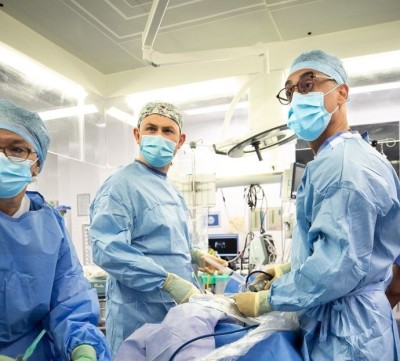A patient who was left in agony after eating a pretzel has had her arthritic jaw mended thanks to a unique service provided by surgeons at Chase Farm Hospital (CFH).
Amanda Cullen, 53, from Enfield, began noticing a problem with her jaw in 2020 when she felt it clicking but it wasn’t until she was out eating lunch with a friend that she realised something was seriously wrong.
She said: “I bit into a pretzel and I felt intense pain. Afterwards the pain came and went, but a few months later I was in continuous agony and I had to take action.”
Amanda, a market researcher, was diagnosed with arthritis of the jaw, which can range from mild to severe and may get worse over time. Patients can have osteoarthritis of the jaw, which is associated with joint overuse and becomes more common as you age. Alternatively patients could have rheumatoid arthritis of the jaw, psoriatic arthritis or rarely, crystal arthritis of the jaw.
Symptoms for all four can include pain, inflammation, restricted joint movement or locking of the jaw, facial pain or pain around your ear or neck, headaches, and may often be mistaken for tooth pain or ear infection. Without effective treatment the pain and restricted movement of the jaw can result in patients only able to eat a soft food-only diet and struggling to speak.
Thankfully, Amanda was referred to CFH, where she had a treatment regime including therapeutic temporomandibular joint (TMJ) arthroscopy. This treatment involves key-hole surgery under general anaesthetic in which a small telescope is inserted into the jaw. Surgeons might remove scar tissue and thickened cartilage, reposition displaced tissue, remove inflamed tissue, reshape parts of the jawbone and insert anti-inflammatory medicine.
Surgeon Deepak Komath said: “Jaw joint arthritis is very common but has been poorly understood over the years. It’s been treated in different ways until now, including physio and wearing a night guard, but the outcomes have been consistently poor.
“One of the things that has helped us offer a better solution is that we now have access to high quality images through MRI which shows the disease in greater detail. Previously we would have had to wait until there were bone changes to see it on an X-ray or CT scan, but with the MRI scan we can see the arthritic process affecting the joint at a much earlier stage of disease and go in and do something about it.”
Since 2018, over 300 patients have been treated at CFH, with more than 85% who have had TMJ arthroscopy reporting a significant reduction in pain and increased mouth opening.
CFH is currently the only NHS hospital to offer ‘arthroplasty’ through the keyhole access. This takes place during the TMJ arthroscopy procedure with diagnosis and treatments available including biopsies, damage repair and reconstitution.
Deepak said: “The arthritic process displaces the joint’s cartilaginous disc. We are able to release this and reposition in the correct place in readiness for post surgical physiotherapy to improve function. In addition we can also use the patient’s own platelet rich plasma as a powerful anti-inflammatory substance which we inject directly into the tissues. This has also been shown to improve function and reduce pain. Other trusts are now looking to follow suit after the success of the procedure here.”
Deepak added: “For those whose keyhole surgery is unsuccessful, jaw replacement surgery can be considered but this is very much the last resort as it is a much bigger surgery with all the associated risks that entails.”
Amanda added: “My bite isn’t 100% perfect and my teeth can still click a bit but I can eat anything I want and I’m no longer in any pain. I’m so grateful to Mr Komath and his team. Having the operation has made such a huge difference to my quality of life.”

 Translate
Translate